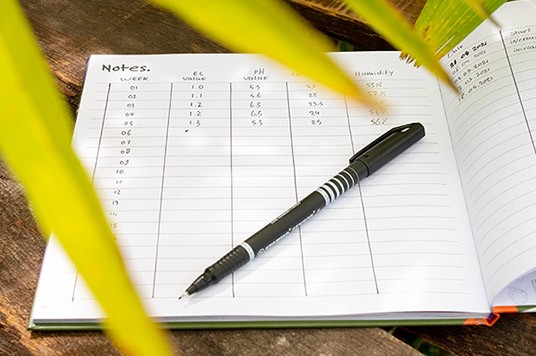Ph levels for plants: The ideal soil ph and nutrient water ph
The pH level is a value for measuring the acidity of both soil and water. It is important to know the pH level, because every plant is different. Some plants need an acidic soil, whereas others don't.

PH scale
The pH is measured on a scale ranging from 1 to 14. A pH of 7 is considered neutral. A lower level means the soil or water is acidic. The lower the pH gets, the more acidic the soil or water will be. PH levels of 7 or higher the soil or water is considered alkaline. This means there is a large amount of calcium in the soil or water. The higher the pH value gets, the more alkaline the soil or water will be.
Ideal soil pH
The soil pH can be acidic, pH neutral or alkaline. How acidic the soil is depends on the amount of calcium in the soil. This is different for each kind of soil. For instance, sand and peat soils are generally more acidic than clay soil, since they contain less calcium. The pH level creates a balance in the soil by means of chemical processes. For proper functioning of the soil life that supports your plants, we recommend a soil pH of 4.8 or higher. What the exact ideal pH level is depends on the substrate you're using:
100% NATURAL: pH 5.5 - 7.0
100% TERRA: pH 6.0
100% COCO: pH 5.5
100% HYDRO: pH 5.5
What happens if soil pH is to high or too low?
It is important to keep a good eye on the pH level. This is because not all nutrients are absorbed optimally at the same pH. For measuring the pH you can use a pH meter. Is the pH too low? Then your plants may suffer from a magnesium deficiency. Soil life may also be inhibited. Is the pH level too high? Then your plants are at risk of multiple deficiencies. These include manganese, iron, boron, zinc and copper deficiencies. These deficiencies will result in a lower yield.
Influencing the pH of soil
Is your ground too acidic? Then you could spread calcium. Spreading calcium leads to chemical reactions in the soil. These increase the pH level. You can also cultivate your soil. When doing this, air will be brought into the soil. This causes the built up carbon dioxide to escape easier. The soil can then dry up and fill the holes left behind by the carbon dioxide with air. Of course, we also offer a product that can help you out if your soil is too acidic. Calcium Kick helps you increase the soil pH and also improves the structure of your soil. This causes nutrients in the soil to be better absorbed by your plants.
PH level of water
Like the pH of soil, the pH of water is very important during growing. This is because a nutrient solution always needs to have the correct pH level. Only then will the plant receive its nutrients in the right amounts. When this happens your plants will grow quicker. Because of this, it is important to always keep an eye on the pH levels of your nutrient solution. When the pH is too low your plants may die because they do not get enough nutrients. When it is too high, algae may turn the water green. This too can cause your plants too die. The ideal pH level again depends on the substrate you're using. You can see the ideal pH level above.
Measurement of pH in nutrient water
Measuring pH is not useful when growing organic with 100% NATURAL substrates and base nutrients. Always measure pH when growing hydroponic with 100% COCO or 100% HYDRO or with peat with 100% TERRA products. Always prepare your nutrient water before you determine the pH level with a pH meter. We offer multiple products that can help you regulate the pH in your nutrient solution. You can use Lemon Kick (organic) or PH Min to lower pH or PH Plus to increase pH.
Did you know that measuring EC value is also important when growing plants? Click on the grow topic below
Do you need help from an expert during your grow?
Contact our Grow Expert via Servicedesk.
